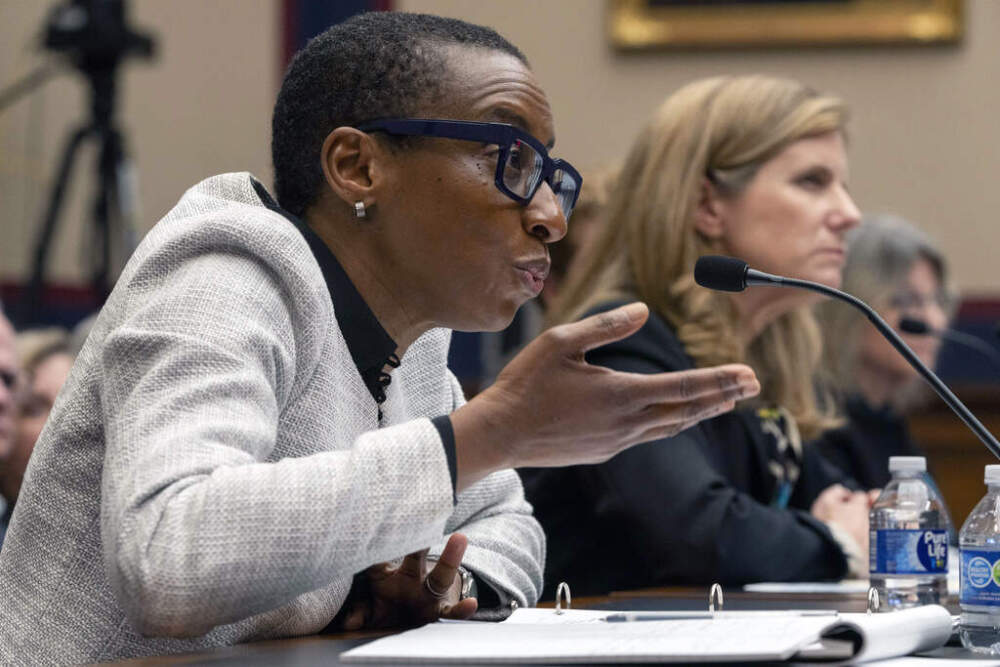Advertisement
Claudine Gay resigns as Harvard president, following weeks of controversy
Resume
Claudine Gay has resigned as Harvard's president, just six months into her post.
The decision makes Gay, Harvard's first Black and second female president, the shortest-tenured head in the university's history.
In a letter to the Harvard community Tuesday, Gay called the decision "difficult beyond words," but said that in consultation with the Harvard Corporation, the university's top governing board, it became clear to her that it was in Harvard's best interest.
According to a separate email from the Harvard Corporation, Alan M. Garber, Harvard's provost for the past 12 years, will serve as interim president until a new permanent leader can be found.
In their statement, the 11 fellows of the Corporation said they had accepted Gay's resignation "with sorrow," adding Gay had shown "remarkable resilience in the face of deeply personal and sustained attacks."
"While some of this has played out in the public domain, much of it has taken the form of repugnant and in some cases racist vitriol directed at her through disgraceful emails and phone calls," the statement said.
The decision comes after months of controversy about Gay's handling of pro-Palestinian protest on campus and mounting allegations of plagiarism in her academic work as a political scientist. And it represents a jolting reversal of course atop America's oldest university: the Harvard Corporation had announced plans to stand by Gay in mid-December.
On Tuesday, the Washington Free Beacon — a conservative outlet that has been critical of Gay since Hamas's Oct. 7 attacks on Israel sparked campus protest — reported six new allegations of plagiarism by Gay, implicating nearly half of her published articles.
Last month, Gay and the Corporation said she would amend or correct writings published between 2001 and 2017 as well as her 1997 PhD dissertation for failing to attribute or cite certain sections. However, the school said it found no evidence of research misconduct by Gay — findings which have split some in the campus community about standards set for university presidents versus students.
The news of Gay's resignation left many on campus reeling.
Ryan Enos, a professor of government, helped lead a petition campaign in support of Gay in mid-December. He called her departure "incredibly sad" for Gay, for Harvard, and for American universities.
"Regardless of what you think of the merits of her positions on international issues, or... the accusations against her around plagiarism, those are things that need careful consideration," Enos said. "This was certainly not an example of that."
Harvard has grown increasingly diverse in recent years, and Gay's leadership had a particular meaning, said Jaime Sanchez, Jr., a postdoctoral fellow at the school.
"As the child of [Haitian] immigrants, and a person of color, there was a lot of hope and inspiration that derived from her just being there," Sanchez said.
As a result, her abrupt departure is all the more painful, he said.
Still, some Harvard faculty expressed a harder line about the school's handling of plagiarism accusations. Omar Haque, a physician and faculty member at Harvard Medical School, called the pattern of duplication in Gay’s work “reckless.”
"I think Harvard should hold presidents to higher standards than they hold their faculty. And they should hold their faculty to higher standards than they hold their students, who are still learning and still learning how to write academic papers," he said.
Gay began climbing the ranks at Harvard as an associate professor of political science in 2008. She served as dean of the university's Faculty of Arts and Sciences between 2018 and this July, when she took the reins as president.
She will return to her faculty position in the university's departments of government and African and African-American Studies.
With reporting from Carrie Jung and Barbara Moran.
This article was originally published on January 02, 2024.
